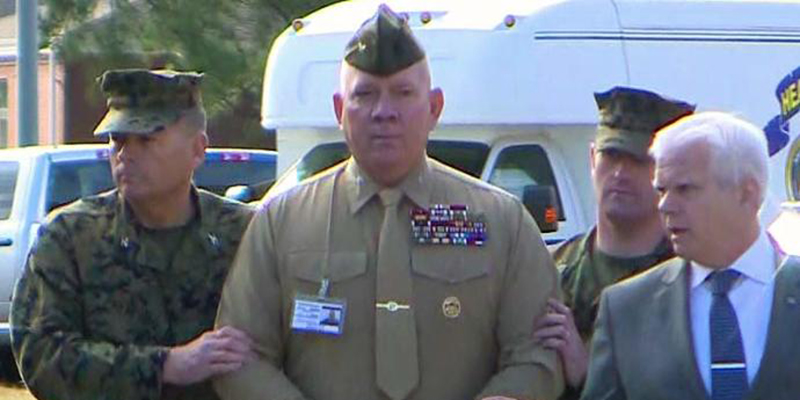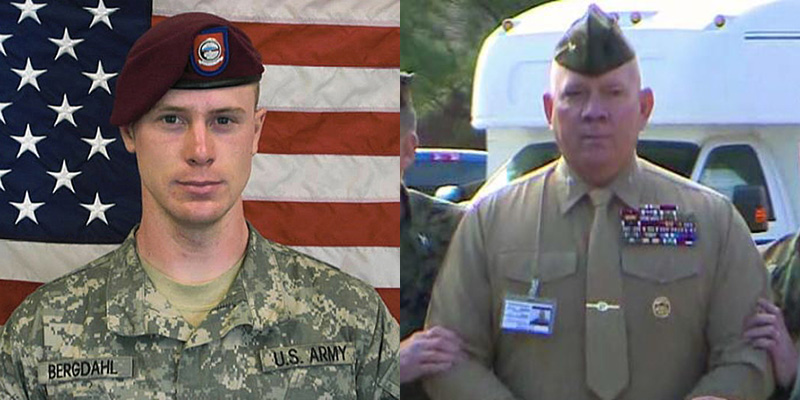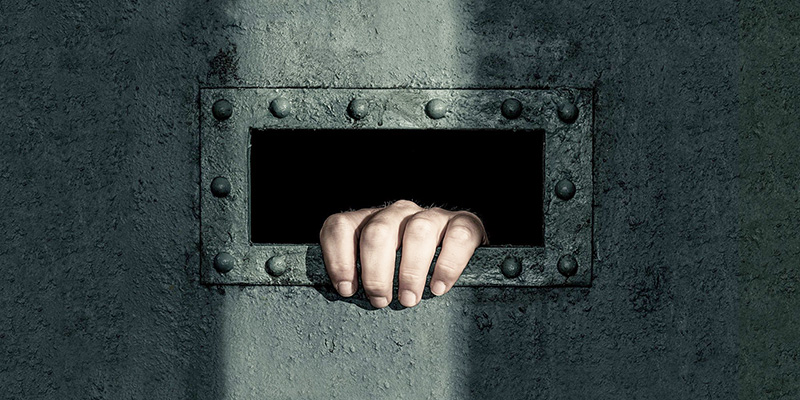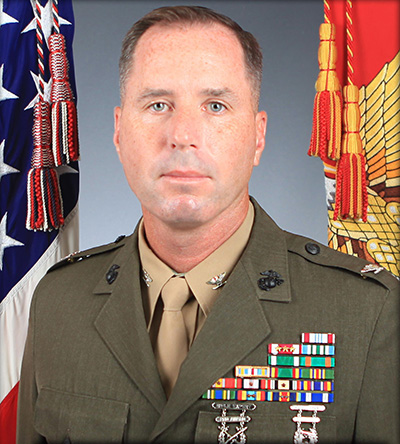
 Colonel Daniel H. Wilson was charged with UCMJ articles 120, 120b, 128 and 133. Out of fourteen specifications, the jury found him guilty of only one. Colonel Dan Wilson was tossed in a military prison where he resides today.
Colonel Daniel H. Wilson was charged with UCMJ articles 120, 120b, 128 and 133. Out of fourteen specifications, the jury found him guilty of only one. Colonel Dan Wilson was tossed in a military prison where he resides today.
A team of attorney’s filed a 92- page BRIEF on Colonel Wilson’s behalf with the United States Navy-Marine Corps Court of Criminal Appeals (NMCCA) putting before the court several compelling reasons why Col. Dan Wilson’s conviction should be set aside.
The mother of the alleged victim has filed a 25-million-dollar lawsuit. To many, this entire case against Col. Dan Wilson appears to have been a ploy to use the military justice system to first obtain a conviction, then grab all the money possible with a civil suit using the military conviction as “evidence” of the harm. The military fell for it, becoming a willing participant in the charade.
WRITTEN MATERIAL IS OK ONE DAY,
THEN CONTRABAND THE NEXT DAY
Unfortunately, Colonel Wilson is having difficulties adapting to prison life. His wife feels he is the subject of frequent harassment by his jailers. Obviously, going from a decorated Marine Colonel and combat veteran to a prison inmate is a difficult transition for anyone to make. It’s possible that some of the harassment is being originated because enlisted guards love to make a former senior commissioned officer gravel at every turn.
When inmates meet with family and friends, they normally pass written information along in the form of notes kept on a yellow legal pad. Inmates sometimes will keep a daily diary that to while away the boredom and give to family members for a FaceBook site to keep all those interested in how their relative or friend is doing behind bars.
In return, family and friends normally bring in letters from family or friends that cannot attend visitation hours because of venue constraints. Most of the time, these things have been allowed by prison guards who would occasionally read what is being passed back and forth. Unless it’s a ten step guide on how to escape from prison or a book entitled the Shawshank Redemption, harmless letters have frequently been allowed. Dan’s daughter maintains his FaceBook site and there was never a problem until one day where the notes from Colonel Wilson was considered as contraband and a violation of the prison’s anti-trafficking rules.
VISITATION IMPORTANCE
Dan’s wife Susan Wilson and other family members make sure that during visiting hours, Colonel Wilson always has someone to visit him. America discovered over many years that when our servicemen and women are taken prisoner during a time of war, the most important thing for them is to know they have not been forgotten by either their country or their family.
American prisoners imprisoned in Hotel Hanoi during the Vietnam War were beginning to believe their country had written them off. But the day after Christmas, the earth began to shake from a tremendous bombing campaign called Operation Arc Light. ArcLight began in 1965 but was withdrawn for a while because our government believed that showing some compassion would encourage the enemy to become serious about peace talks.
Operation ArcLight was re-activated on February 8, 1972, when President Richard Nixon resumed bombing of North Vietnam because he knew America was being played. So, in an effort to move peace talks along, Nixon brought back Operation ArcLight. Over 15,000 men were sent to Andersen AFB on temporary duty for the return of Operation ArcLight. With limited barracks and other facilities, tents were set up for use by men working 80-hour weeks to put the hurt on the enemy.
When the bombing ceased for a while, the American POWs were in despair thinking their country had given up the fight and they had been forgotten. As the bombs suddenly could be heard again, our POWs were cheering and crying as the mighty American Eagle began to strike hard at enemy emplacements. The guards were incensed because members of their own family were killed by the bombing.
Their extreme anger was manifested in horrific beatings of American POWs. As some of the POWs laid on the floor bleeding from severe beatings, they smiled knowing their country had not forgotten them and were still in the fight. The physical pain wasn’t nearly as bad as the mental anguish our POWs felt as they began to believe they had been forgotten. Some were beginning to lose hope. This is why Susan Wilson visits her husband at each and every visitation session, just to let him know that he will never be forgotten and that her love for him is solid and unbroken.

READING GLASSES AND THE TROUBLE IT CAUSED
A few weeks ago, Colonel Wilson handed his wife his broken reading glasses, asking her if she could get them fixed at a place that could repair or replace the glasses. Wilson is one of the oldest inmates in the military prison system and his eyesight is such that he needs his glasses, especially to read. She went to various optical stores but no one had the correct parts, so she gave him her reading glasses as a stopgap measure.
Dan and Susan Wilson decided to sell his classic Harley-Davidson motorcycle to supplement their failing income. When your income is suddenly cut off because your husband has been thrown in prison, cash flow problems generally follow. As luck would have it, Susan Wilson discovered his old reading glasses in the saddlebag of his motorcycle they were planning to sell. They were cheesy ten-dollar Walmart specials but she thought they might be able to help him until new ones could be purchased down the road.
The next visitation period, his wife Susan delivered the reading glasses she found in his motorcycle saddlebag. She also wanted to pick up any notes he might want to pass along to their daughter.
Col. Dan was happy to see her but even happier to get his reading glasses. Even the small things that we regard as almost insignificant can mean a great deal to someone who stares at four walls all day long. Even though they were old and beat-up, it was a Godsend to be able to have his glasses to read. He handed his wife his notes on a yellow legal pad that had his good wishes for everyone reading his FaceBook page.
AFTER EACH VISITATION THERE IS A MANDATORY STRIP SEARCH
After each inmate is done with visitation, they are taken to be stripped and searched. The military is determined not to become like their civilian counterparts where drugs and cell phones are constantly being smuggled into prison. It’s even worse if something is passed to an inmate that can be made into a weapon. The military takes extraordinary measures to ensure that contraband does not enter a military prison.
In the civilian prisons, there is usually bulletproof glass separating inmate and visitor with a telephone handset on each side. In this way, all conversations can be recorded and nothing can be passed from visitor to inmate. The reason for a strip-search is unnecessary. But in the military brig, the inmate sits across the table from his/her visitor. Occasionally, some items can be passed back and forth knowing they are on camera all the time and after the visit, there will be a strip search of the inmate.
Colonel Wilson was so pleased to have his old reading glasses. He could see again. They made no attempt to conceal the exchange of the reading glasses. The guards saw it and the camera picked it up, but during the strip search, he was handcuffed and tossed into solitary confinement because the reading glasses were considered contraband. After spending about two days in the hole, he was taken back to his squad bay. Usually, for a violation of the trafficking or contraband rules, the inmate would stay much longer than two days.
As Wilson and the guard walked down the passageway, Col. Wilson asked the guard for his reading glasses. The guard went to where all the contraband was held and brought Col. Wilson his reading glasses. It was kind of weird, Wilson was tossed into solitary confinement for receiving reading glasses, and immediately following his release from the hole, they returned his reading glasses. What’s wrong with that picture? He thought it was over, but the military was drafting up paperwork for his egregious offense.
FROM BAD TO WORSE
Col. Wilson, unfortunately, likes to dip tobacco. We admonish the Colonel because dipping tobacco is believed to cause fatal oral cancers, tooth and gum loss. Associated cancers include tongue cancer, lip cancer, cheek cancer, gum cancer, throat cancer, and cancer in the roof and floor of the mouth. Tobacco dip is colloquially called “chew”, “snuff”, “chaw”, or “fresh leaf” among other terms.
After the reading glasses fiasco, a week or so later, Susan Wilson brought two small pouches of dip, not much larger than postage stamps, with her when she visited Col. Wilson during regular visitation hours. She knew how much he enjoyed his tobacco chew. While speaking with his wife Susan and brother Jon Wilson, he suddenly noticed seven or eight guards donning their riot gear with face shields, helmets, and batons.
Wilson said to his wife and brother, “Something’s going on.” He didn’t know the guards were “massing at the border” and planning to attack him. Col. Wilson didn’t know was they were assembling to physically attack him for illegally receiving the tobacco which was clearly a contraband item. If they put him in the hole for reading glasses, he surely was going to receive a firing squad for receiving tobacco dip.
Suddenly the guards physically assaulted Col. Wilson knocking him off his chair and dragging him off to be stripped and searched. The guards caused such a ruckus it scared the other visitors attending visitation hours. The violence stunned his wife and brother who could do nothing but sit and watch Wilson be physically accosted in the visitation area. He was ultimately charged with trafficking in tobacco and reading glasses. It wasn’t weapons, cocaine or chrystal meth, it was trafficking in tobacco and reading glasses. And for that, he was thrown in solitary confinement.

Obviously, the guards have to be careful about what is being given to prisoners for their own safety. They also have to be careful about anything that could have value behind the walls which feed the prison black market. We understand the importance for absolute control over what comes into the prison, but attacking a prisoner in front of all of the other visitors and throwing him in solitary confinement for two months over two small pouches of tobacco and some reading glasses seems a bit over the top.

The military term for solitary confinement is called “special orders.” It means you’re thrown into a cell with a bunk bed and one steel stool. You are not allowed to touch the bunk bed until taps are sounded at night. You cannot sit on the floor, the only place you may sit is on the steel stool. You are allowed to stand or sit, but you may not sleep, even if you could do that sitting upright. Not being able to lay down, or even sit down in your bunk until taps are sounded is just more harassment that seems to be unwarranted over some tobacco and reading glasses.
When in solitary, guards select what you will eat and bring it to your cell. You are prevented from speaking with any other prisoners. You can receive no phone calls or visits from anyone and you’re watched constantly just like the Army guards did to the Nazis at Nuremberg, Germany 72 years ago.
They originally gave Col. Wilson three months in the hole, but Warden John J. Nolan who works for Col. Stephen F. Keane who is the commanding officer of the Security and Emergency Services Battalion (SES) felt three months in the hole was excessive, given the fact it was only chewing tobacco and a lousy pair of reading glasses. The Warden instead reduced Col. Wilson’s sentence from three months down to two months in solitary. While in solitary confinement, the guards gave Col. Wilson a Bible and a book on prison regulations. He could not read either without his glasses.
